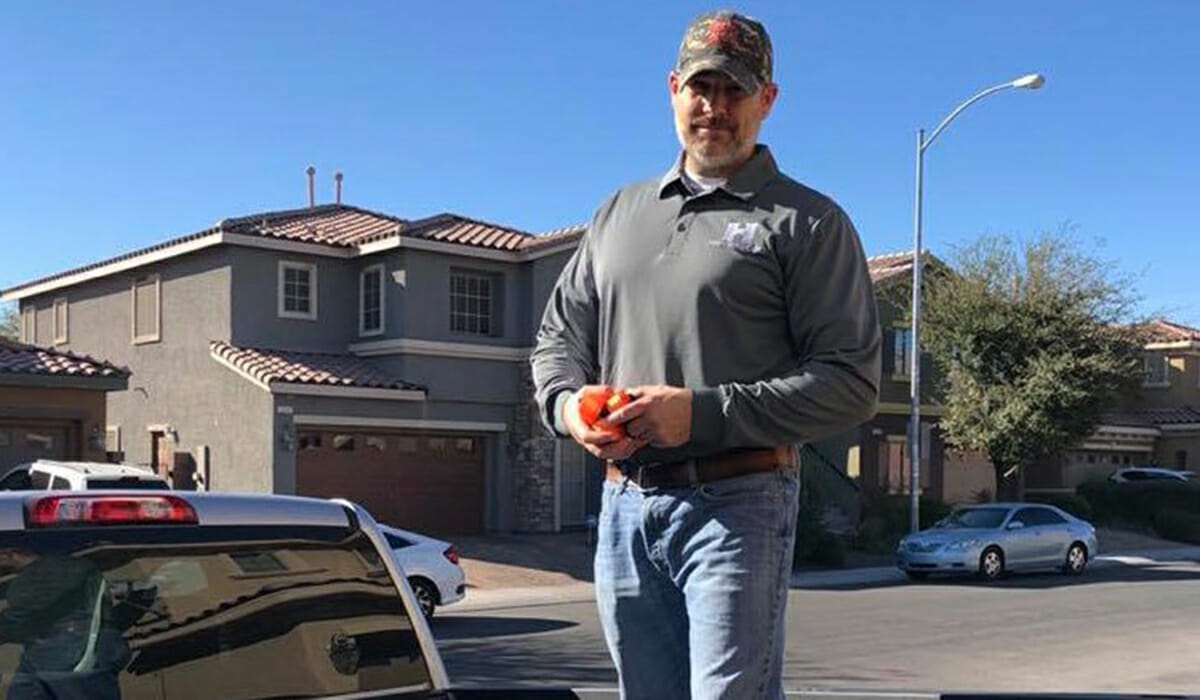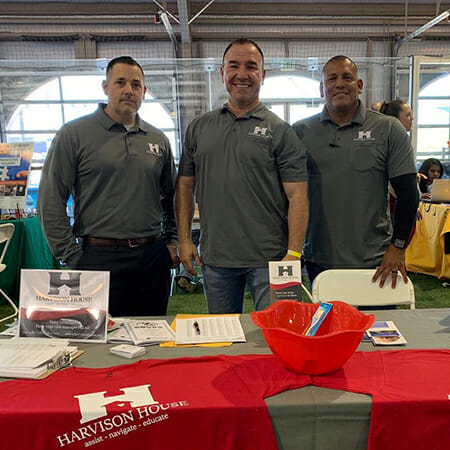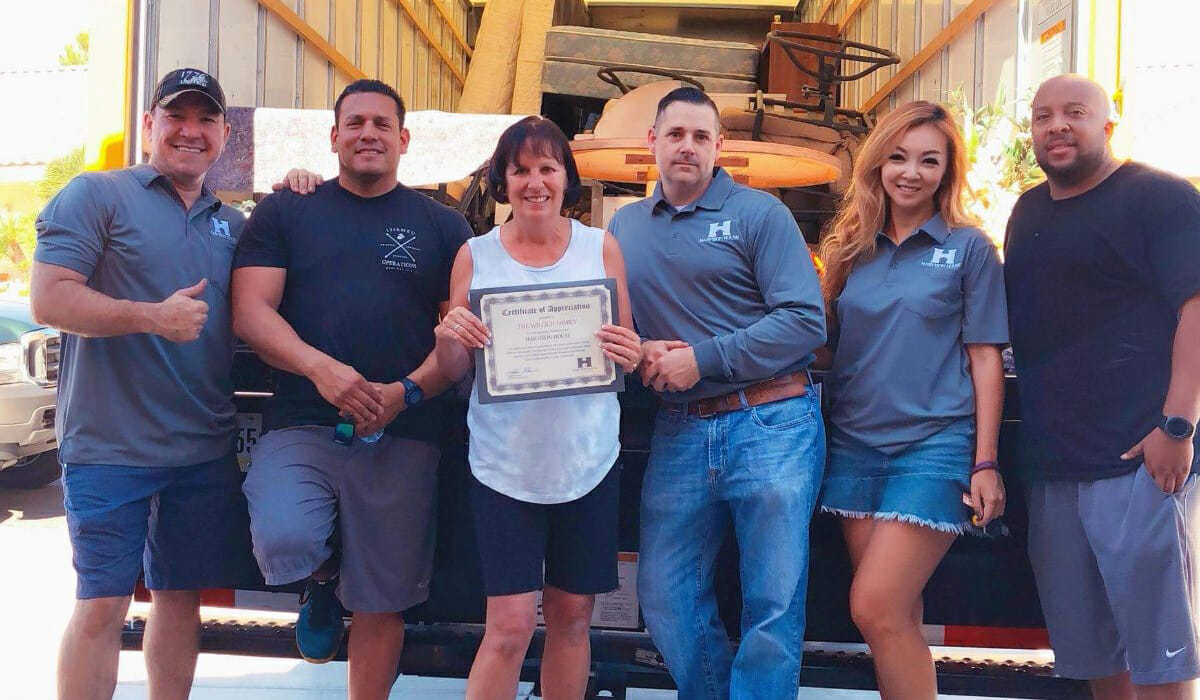Army Veteran Starts Foundation to Provide Furniture to Low-Income Veterans

Meet Daily Point of Light Award honoree Adam Harvison. Read his story and nominate an outstanding volunteer or family as a Daily Point of Light.
After serving in the Army for over 20 years, Adam Harvison is dedicating his life to supporting his fellow veterans. Outside of his full-time job helping to house homeless veterans in his Las Vegas community, Adam continues to assist veterans as the Founder and President of the nonprofit Harvison House. Since 2017, Harvison House has provided household furnishings to over 125 veterans receiving housing assistance.
Harvison House collects gently used furniture and equipment from donors around the country, cleans and repairs it, then personally delivers the furniture to the veterans’ homes. Adam said the furnishings give veterans a sense of stability and comfort. He has even noticed a decrease in evictions within the veteran community he is assisting.
“People are just really happy now that they can actually get off the street, have someplace they can go home and lay their head, and feel proud of it,” Adam said.
Describe your volunteer role with Harvison House.
We are a nonprofit organization that supplies household furnishings to veterans of low income who get newly housed into a property, whether it’s through the VA, U.S.VETS, HELP USA, or through any other type of organization throughout the community. What they do is contact us, and the case managers give us an itemized list of what that veteran needs, and we fulfill it to the best of our ability.
How are you able to fulfill these requests?
We actually get furnishings from donations from all over the community. We’ve had donations from New Hampshire, New York. We’ve had some from Pennsylvania, from California, Arizona. We don’t even advertise our organization. People have just spread it through word of mouth because we’re very different from any other organization out there. We took a lot of our military experience and put it towards helping veterans specifically. When someone donates something to us, we present the family with a certificate of appreciation showing we greatly appreciate what you’re doing for the community, because if it wasn’t for them, a lot of these veterans who are in need wouldn’t have anything. Case managers throughout the community contact us and they say “Hey, we have a veteran who is in need of this, this and that.” If we have it, we fulfill. Then after we take the furnishings and deliver them to the veterans, we actually take pictures of all the furniture that was delivered. We write stories and send them back to the family who donated it so they can see where their hard-earned money went. It’s only fair they know where their furnishings are going. We took a very structured atmosphere to put everybody in full 100 percent transparency, so from start to finish, everyone can see everything [we’re] about. We don’t include the veterans name. We just let them know what type of branch they were in and we write a nice little story about it and send it back. That has really been our calling card.
All of us in the Harvison House, we all work full time jobs outside of this. I actually work 10 hours a day and house the homeless veterans of the city of Las Vegas. The majority of our volunteers are metropolitan police officers, school teachers, or other people who actually house homeless veterans, too. We’re all intertwined in the community 100 percent, even outside of the Harvison House organization. When we built our Board of Directors, we put on there a professional resume writer, a drug and alcohol person. We have somebody to help write disability claims. We have housing. We put everything in place. A lot of veterans we work with are Vietnam vets and they really don’t use the VA [United States Department of Veteran Affairs] anymore, but they can come to us and we can assist them in other things too — getting them clothing, closets, food banks, getting them some resume writing, trying to get them some interviewing skills, that type of stuff. Everything we do, we don’t have grants. It solely comes out of me and my wife paying for everything, which we don’t mind, because we see the need in the community. … We basically put everything in [Harvison House] and put it all in God’s hands and were like, this is what we need to do. We sold our house for this. Within a year and a half time frame, we went from a two-car garage to a 5,000-square-foot storage facility. It shows the weight of how many people really want to help because they know that through us, they’re going to see their good deed done.

When did you start Harvison House, and what inspired you to do so?
I believe it was December 2017. A lot of it has to stem with Pittsburgh [where Adam grew up], the need that was there after my dad lost his job at the mill. People donated to us and as a kid growing up, that meant a lot to me, whether it was a stick of gum or a pair of shoes. When I got out of the military, we actually started having veterans live with us who we actually served with. We would bring them into our home and we would tell them they could stay with us for free as long as they got situated — get a job, go to school, those types of things. Then I was working for an organization out of New York and it all started with an electric wheelchair. [Someone] asked me if I wanted an electric wheelchair and a lot of people said no. I said I’ll take it, and that’s how it started. It spiraled from there. Constantly trying to help somebody out in any single way. To give somebody an electric wheelchair who doesn’t have money for a bus pass, who can put a little box container on the back of that scooter just so they can go to the mission or to the food bank — that completely changes their world because they don’t have to spend eight hours on a bus just to go get the little box of food that’s going to keep them going for a couple of days. It’s been a really beautiful blessing to be able to help so many people in need.
What kind of feedback have you received from the veterans you have helped?
We get a lot of, “Now I’m living like a king.” We’ve had people say they finally feel like they are at home. They greatly appreciate the people who donate. … They’re so grateful and so thoughtful for everything. We have a lot of people who actually break down and cry and say they’ve never had things this nice, because we don’t take junk. We won’t provide junk to anybody. We have a lot of people who have never had such nice things and they get excited. While we’re delivering it, they’re bringing their friends over right then and there. They’re showing them and they’re all excited because that night they might want to play cards on the kitchen table and now they have one to do so. We get a lot of really good feedback in regards to it and it’s very touching. It’s very emotional, to see the roller coaster of someone who has absolutely nothing that’s living in an area where they don’t want to go outside because they don’t know how bad it is, because they might not be from Las Vegas, and we come in and now they don’t have to leave their home again and they have that comfortability. We mainly surprise everybody. We have kitchen starter kits. We set up their full kitchen, livings rooms. If we go there and we feel they need something else, we go in and get it — because sometimes the case managers don’t provide us with everything they need — no matter how small it is. It doesn’t matter if they just need a spoon. Most managers just say they need a couch, but when we get there, if you don’t have a kitchen table or a television, you’re still not sustainable because now you’re just going to stare at a wall.
Do you have any plans or goals for the future of your organization?
Since I have a lot of people who I served with throughout the military, I have actually been discussing trying to get this into California, Arizona, New York, Pittsburgh, North Carolina. It wouldn’t be the Harvison House, it would be their name that would be the structure, but we want to incorporate it through. … We really think we have something that is a lot more different than anybody else, through our process. We’re not looking for fame. We’re not looking for anything. We’re just looking to help those in need. That’s it. That’s why we don’t even advertise. People have asked us, they want to buy shirts from us and stuff from all over the country, and we’re working on some little things to bring some income into the organization. But everything is in God’s plan and God’s time.
What’s been the most rewarding part of your work?
Getting to meet everybody — the donors, the people who serve the country, and just [see] the expressions on everybody’s faces. All our volunteers are really free spirited and having a great time. We get a lot of feedback of how wonderful the volunteers are and that’s the reason they’re volunteers, because their heart is there. It’s not about money, it’s about their heart and what they get to bring back to the community. Being able to work with the volunteers is just as rewarding because they work all day long, and on weekends they give up their time too. They actually ask me when’s our next delivery. As a whole, from start to end, it’s 100 percent rewarding. Nothing works without the community or the volunteers. Harvison House would never exist.

Why do you think it’s important for others to give back?
We brought a lot of the younger people in because the times have changed. We’re trying to partner right now with JROTC [U.S. Army Junior Reserve Officers’ Training Corps], and we just partnered with the military base. It’s good for the younger generation to see that not everything is great. There are people out there who really need help. When we bring them out, we let them realize, don’t walk past someone who is in need. Help them if you can. We’ve been in some very risky situations because some of these places in Las Vegas are pretty risky. We have so many people who their stories don’t need to be told, but people need to be able to assist them. Not everything is about the dollar. It’s about human kindness and making sure that people understand that everybody is a human being and everybody is equal. Regardless of the situation, everybody is equal and everybody should be treated the same. Everybody is still entitled to nice things, no matter how down they are on their luck.
What do you want people to learn from your story?
Just know that there are people out there who really need help. Their pride might not let them tell you that story, but there are people out there who are willing to help. Never give up on the community and the community is never going to give up on you.
Do you want to make a difference in your community like Adam? Find local volunteer opportunities.
